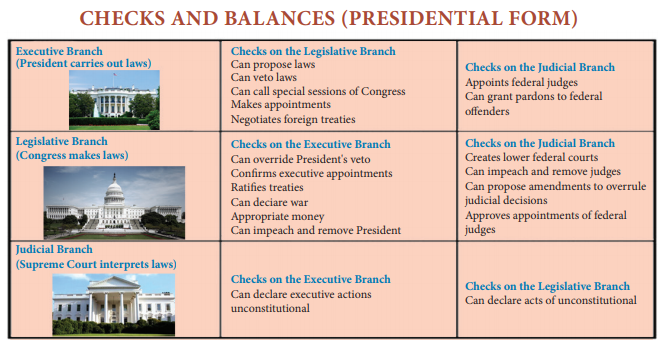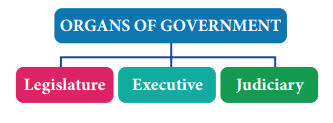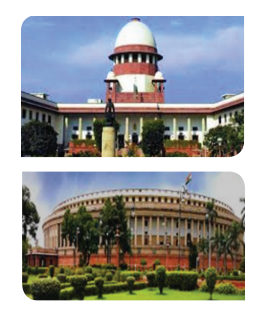Chapter: 11th Political Science : Chapter 6 : Forms of Government
Forms of Government
Forms of Government
Introduction
The Government is the main agency of the state. It comprises several members belonging to political and administrative wings. It serves as the instrument for delegation and execution of the state policies for the welfare of the people. It formulates expresses and realises the will of the state. It exercises certain legislative, executive and judicial powers based on the constitution and the laws. There are three organs in government, namely – Legislature, Executive and Judiciary. These organs carry out the activities of the state. Governments are classified under Unitary, Federal, Parliamentary and Presidential forms.
Think about the following statements
a.What comes to your mind when you hear the term
Government?
b. In what way you, your family or the citizen are
connected with government?
c. Can you identify the role of government in your
day to day life?
d. Do you think the government is inevitable or
citizen can survive without the government?
e. Can you differentiate the role of elected
representatives and appointed Bureaucrats role in the functioning of
government?
f. Identify
some government departments and segregate into central government, state
government and local government.
g. Try to describe your own definition of
Government ……….
No man under takes a trade he has not learned, even
the meanest: At everyone thinks himself sufficiently qualified for the hardest
of all trades, that of government. –Socrates
Approaches to the study of Government
Studying governments from different approaches help
us to understand government from its evolution to its performance in the
contemporary times. The approaches to study the Government are...
1. Comparative-Historical Approach
This approach studied the western political
institutions from ancient to modern times, this approach is descriptive in
nature, Aristotle, Montesque and Locke adopted this approach to study and
analyse governments in those days.
For instance before writing his monumental work
politics Aristotle studied 158 constitutions. Montesque studied the working of
the British constitution and came to the conclusion that the stability of
British constitution was due to the adherence to the principle of separation of
powers.

2. Legal-Institutional Approach
Scholars like Bentham, Austin and Dicey
adopted this approach,
This approach focuses on formal legal structure of
political institutions.
They helped to develop certain theories which
explain the relationship and interconnection between government and Law. Bentham
is the distinguished legal reformer in England Likewise Austin provided a legal
base to sovereignty which is indivisible, inalienable and absolute. A.V.Dicey
judged the government on the basis of law and its
applicability to different branches of government.
3. Political Economy Approach
This approach deals with economic aspects of the
government which gives economic interpretation of politics also deals with role
of market, mode of production and delivering goods to the society. This
approach is classified into liberal political economy and the Marxist political
economy approach.
4. Political Sociology Approach
This approach derived its ideas from sociology and
anthropology also known as systems approach. Political sociology asserts that
government or political system is a sub system of a larger social system. This
approach examines the interaction between the larger and the sub systems.
Early Montesque proposed a three-fold
division of Government namely Republican, Monarchical and Despotic government
Republican
Government: “People possess
the sovereign Power”.
Monarchical
Government: “Rule by one
single person and governed by fixed and established laws”.
Despotic
government: “Rule by one
single person but there is no fixed rule for governance, everything
conducted by his will. According to Montesque the survival of the
government depends on “persistence in given society of that particular spirit
which is characteristic of the form”.


Related Topics